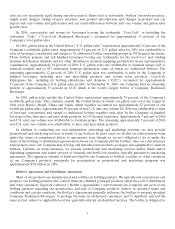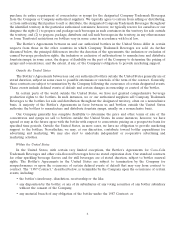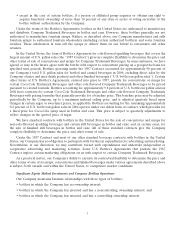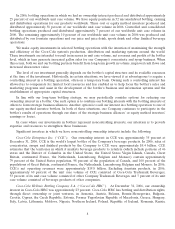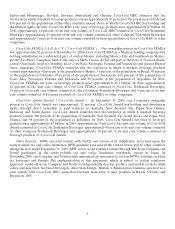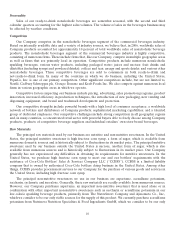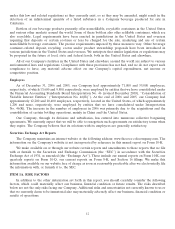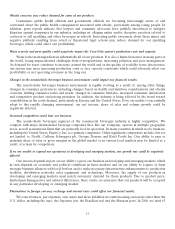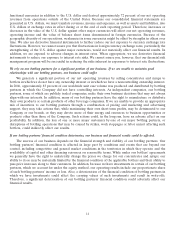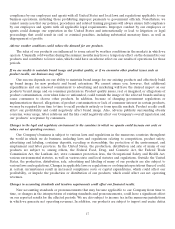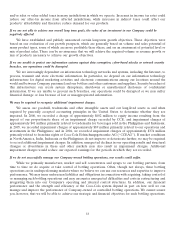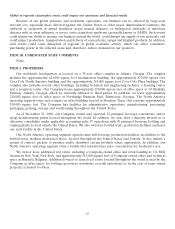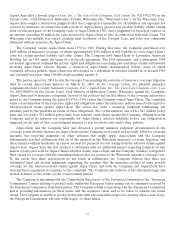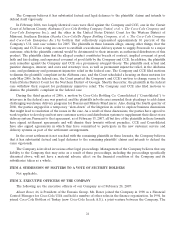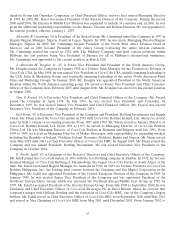Coca Cola 2006 Annual Report Download - page 17
Download and view the complete annual report
Please find page 17 of the 2006 Coca Cola annual report below. You can navigate through the pages in the report by either clicking on the pages listed below, or by using the keyword search tool below to find specific information within the annual report.If we are unable to renew collective bargaining agreements on satisfactory terms or we experience strikes or work
stoppages, our business could suffer.
Many of our employees at our key manufacturing locations are covered by collective bargaining agreements.
If we are unable to renew such agreements on satisfactory terms, our labor costs could increase, which would
affect our profit margins. In addition, strikes or work stoppages at any of our major manufacturing plants could
impair our ability to supply concentrates and syrups to our customers, which would reduce our revenues and
could expose us to customer claims.
Increase in the cost of energy could affect our profitability.
Our Company-owned bottling operations and our bottling partners operate a large fleet of trucks and other
motor vehicles. In addition, we and our bottlers use a significant amount of electricity, natural gas and other
energy sources to operate our concentrate and bottling plants. An increase in the price of fuel and other energy
sources would increase our and the Coca-Cola system’s operating costs and, therefore, could negatively impact
our profitability.
Increase in cost, disruption of supply or shortage of raw materials could harm our business.
We and our bottling partners use various raw materials in our business including high fructose corn syrup,
sucrose, aspartame, saccharin, acesulfame potassium, sucralose and orange juice concentrate. The prices for
these raw materials fluctuate depending on market conditions. Substantial increases in the prices for our raw
materials, to the extent they cannot be recouped through increases in the prices of finished beverage products,
would increase our and the Coca-Cola system’s operating costs and could reduce our profitability. Increases in
the prices of our finished products resulting from higher raw material costs could affect affordability in some
markets and reduce Coca-Cola system sales. In addition, some of these raw materials, such as aspartame,
acesulfame potassium and sucralose, are available from a limited number of suppliers. We cannot assure you
that we will be able to maintain favorable arrangements and relationships with these suppliers. An increase in
the cost or a sustained interruption in the supply or shortage of some of these raw materials that may be caused
by a deterioration of our relationships with suppliers or by events such as natural disasters, power outages, labor
strikes or the like, could negatively impact our net revenues and profits.
Changes in laws and regulations relating to beverage containers and packaging could increase our costs and reduce
demand for our products.
We and our bottlers currently offer nonrefillable, recyclable containers in the United States and in various
other markets around the world. Legal requirements have been enacted in various jurisdictions in the United
States and overseas requiring that deposits or certain ecotaxes or fees be charged for the sale, marketing and use
of certain nonrefillable beverage containers. Other beverage container-related deposit, recycling, ecotax and/or
product stewardship proposals have been introduced in various jurisdictions in the United States and overseas
and we anticipate that similar legislation or regulations may be proposed in the future at local, state and federal
levels, both in the United States and elsewhere. If these types of requirements are adopted and implemented on
a large scale in any of the major markets in which we operate, they could affect our costs or require changes in
our distribution model, which could reduce our net operating revenues or profitability. In addition, container-
deposit laws, or regulations that impose additional burdens on retailers, could cause a shift away from our
products to retailer-proprietary brands, which could impact the demand for our products in the affected
markets.
Significant additional labeling or warning requirements may inhibit sales of affected products.
Various jurisdictions may seek to adopt significant additional product labeling or warning requirements
relating to the chemical content or perceived adverse health consequences of certain of our products. These
types of requirements, if they become applicable to one or more of our major products under current or future
15


